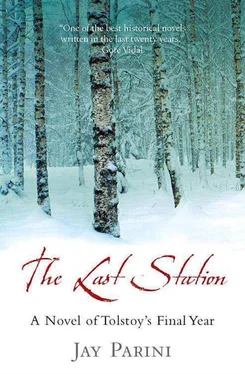I am grateful to you for your honest forty-eight years of life with me, and I ask you to forgive me for everything I am guilty of before you, as I, with all my heart, forgive you for what you may be guilty of before me. I advise you to adjust to the new conditions of life you will face on my departure, and to bear me no ill will.
If you wish to write to me, tell Sasba. She will know my whereabouts and send me anything I need; but she cannot tell you where I am, since I have made her promise to tell no one.
The letter, dated 28 October, was signed in the usual scrawling hand.
Sofya Andreyevna’s face began to quiver, her cheeks like sheets drying in the wind, cracked and blown. The muscles in her neck, like cords, stood out boldly now, as if trying to maintain the balance of her immense head. Her shoulders began to shake. Within a moment, she drew up her floor-length dress and ran down the stairs, howling, out the front door. From the window, we caught a glimpse of her streaking across the lawn.
‘She’s heading for the pond!’ cried Sasha. ‘Go after her!’
Following directly in Sasha’s path, I squinted into the sun and saw Sofya Andreyevna’s figure, a large, gray blur, disappear into a stand of beeches. She ran faster than I could believe was possible for a woman of her age and size.
A couple of servants raced behind me. There was Semen Nikolayevich, the cook, and Vanya, the fat manservant, who ran on spindly legs that barely held him up. I saw Timothy, too – the bastard son – with his toothless grin, waving from a tree.
Sofya Andreyevna had by now passed the beeches and was headed through a grove of lime trees toward the pond. Sasha was behind me, shouting. ‘Don’t run so fast!’
But it would not do to linger. Sofya Andreyevna was nearing the pond. I could just see her in the distance, her white calves flashing.
Suddenly, Sasha passed me, huffing like a steam engine, her skirts wheeling in the sun. Now she was shouting, ‘Hurry! Hurry!’
Sofya Andreyevna stood on the planks by the bathhouse where the women bend to wash the linen. She turned, saw us running toward her, and rushed out onto the wooden bridge. But the slats were slippery, and she fell hard on her back. She clawed at the surface with her red hands, to no avail, and rolled off sideways into the black water.
Sasha was well ahead of me now, approaching the bridge at full tilt. She had managed, while she ran, to tear off her thickly knit wool sweater. But the mossy slats toppled her, too, and she skidded onto her backside. By the time I reached the bridge, she had scrambled to her feet and jumped into the pond ahead of me. I kicked off my boots and followed, jumping feet first into the icy water.
Water is a strange dimension, one that alters the geometry of movement. It makes space and time seem oddly irrational. I seemed to experience a thousand images and thoughts in the brief moments after I hit the water and before I spotted Sofya Andreyevna floating with her cheeks puffed like the gills of a tropical fish.
The distance between me and Sofya Andreyevna seemed infinite, and I felt dizzy now, my skin tingling, my breath short. The murky water was bitter, having been chilled by several terribly cold nights.
Sofya Andreyevna suddenly bobbed to the surface like an otter, face up, about ten yards away. She looked dead already, with water trickling into her open mouth, then slipped completely under once again.
Sasha, who can barely swim herself, was thrashing about not far away, trying to reach her mother without success.
‘Get back to the dock, Sasha!’ I shouted.
‘Help!’
I reached for her hand and helped her back to the wooden dock.
‘She’s drowning!’
‘You mustn’t try to help!’ I said. ‘I can manage!’
Though we were face to face, I was shouting.
Pushing away from the dock, I made a sharp plunge in what seemed like the right direction and, after an impossibly long time, perhaps ten or fifteen seconds, touched Sofya Andreyevna’s head. Snarling my fingers in her long hair, which had come undone in the water, I dragged her back to the bank, rolling her large body up along the margin of the pond. She was black with mud, her eyes closed, her tongue lolling between her teeth.
‘She’s dead!’ Sasha was crying. ‘My mother is dead!’
Vanya, the overweight manservant, was beside Sofya Andreyevna now, and he seemed to know what to do. He turned her over on her stomach and pushed some water from her lungs with his knees, astride her like one hippo mounting another. She lay there in silence, in what I imagined was agony, a great, dark slab of a woman. In a few moments, she was breathing normally, her eyes closed. Life had returned to torture her for another while.
When she was able to stand, we led her back to the house, stopping to rest every few minutes. At one point she fell sobbing to the ground, saying, ‘Let me die here! Let me die! Why must you all rob me of my death?’
Finally, Vanya and I made a seat with our hands and carried her to the house. She was shuddering throughout, and her lips were dark blue. Before we even got her into bed, however, she told Vanya to go immediately to the station to inquire what train her husband had taken.
She fell into a kind of stupor and slept for an hour, but when she woke she began beating her breast with a stone paperweight. We took away the paperweight as well as the penknife on her desk and the vial of opium in her dresser drawer.
Sasha, who seemed quite unstable herself now, sent to Tula for the psychiatric doctor who had helped Sofya Andreyevna during previous crises. She also summoned the Sukhotins by telegram.
When Vanya returned with news of the train Leo Nikolayevich had taken, Sofya Andreyevna wrote a telegram, which she addressed to Train Number 9. It said, ‘Dearest Papa: Return at once, Sasha.’ She had told Vanya to show it to no one, but – thank goodness – he showed the telegram to Sasha (since, like most of the servants, he is loyal to Leo Nikolayevich and dislikes Sofya Andreyevna). Sasha let the telegram go but sent with it one of her own telling her father to ignore all telegrams supposedly from her that were not signed ‘Alexandra.’ Sasha enjoys these little deceits. She is not unlike her mother in this regard.
I sat in the Remington room with Sasha throughout the long afternoon. She told me frankly that she didn’t know where her father had gone. Indeed, his remark in the letter to her mother had puzzled her. He had told several people, including her, that he would probably visit his sister, a nun at the Shamardino, in the province of Kaluga. This was, as he put it, ‘on his way.’ But where he planned to go after visiting Shamardino was anyone’s guess.
Having talked to Sasha and several of the house servants, I was able to piece together what happened last night.
Near midnight, Leo Nikolayevich had been awakened by the sound of rustling papers in his study. It was Sofya Andreyevna, who was looking for concrete evidence of a new will. This was the last straw. A few hours later, he knocked quietly on the door of Sasha and Varvara Mikhailovna, who share a small room on the same floor.
‘Who is it?’ Sasha cried.
‘It is I.’
Sasha opened the door and found her father with a candle in his hand. He had a look of resolution in his eyes.
‘I’m leaving immediately, for good,’ he said. ‘But I need your help.’
Dushan Makovitsky had already been roused and was packing for himself. He would accompany Leo Nikolayevich on his final journey.
They huddled in Leo Nikolayevich’s room, trying to decide what he must take.
‘Only the essentials!’ he kept saying. ‘I can take nothing that isn’t absolutely necessary.’ These included a flashlight, a fur coat, and the apparatus for taking an enema.
Читать дальше












